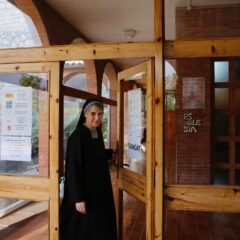Government agencies and spirituality go together like, well, they don’t. Remember that all-encompassing conversation stopper: SEPARATION OF CHURCH AND STATE! As far as amendments go, the first is quite memorable. Not being a constitutional scholar I dare not offer an opinion on the legalities that permit God to be on the currency, in the Pledge of Allegiance and not in the cheers of pep rallies or in the prescriptions of doctors within government funded clinics.
As we approach Thanksgiving it is therefore somewhat unexpected that an undisputed government agency, the Los Angeles County Department of Mental Health is not only counting their blessings, but also training their staff to be aware of and supportive of those individuals who wish to do the same. For the past few months LACDMH in partnership with The California Institute for Mental Health has trained more than 800 staff members to consider spirituality as a vital component of recovery. This spirituality 101 training program introduces the connection between mental health and spirituality and begins a dialogue with providers about the assessment and integration of spiritual interests of clients in their wellness and recovery.Â
This training initiative is only one approach taken by the leaders of the LACDMH to address the well-established role of spirituality as a powerful force in the lives of those they serve. A two-pronged approach includes activities to strengthen the capacity for spirituality to be acknowledged and even celebrated within mental health agencies, as well as sustained efforts to build connections with community faith-based organizations to bolster their support and caring for individuals with mental disorders.
Lest anyone be misled into thinking that LACDMH staff are forming congregations, referring to their favorite synagogues or leading new age prayer services in the basement, let me remind you again, the LACDMH is a government funded agency. Walk into any clinic or office and you will observe that many providers express a hearty fear of crossing a nefarious line (of their own making) that is interpreted broadly as requiring hands off the God/Higher Power talk and by extension is a no fly spirituality zone. Â
So given the politically charged atmosphere and with the admonition of your mother’s voice in your ear shouting “in socially accepted circles one must never, never discuss politics, religion, or sexuality” you may wonder how LACDMH could be so bold. Well, there are several reasons I can share.
First, as used by LACDMH in the context of the wellness and recovery movement, in the broadest sense, spirituality is conceptualized in terms of hope, pursuit of meaningful activities and a sense of purpose in life. Accordingly, one need not be religious or involved in faith-based activities to acknowledge a personal spiritual connection to the universe of his or her choosing. Nothing scary about that at all!
Second, spirituality and religion are well established as having a favorable impact on physical health and mental well-being. There is strong support for spirituality among consumers as revealed by results of a statewide survey conducted by the California Mental Health & Spirituality Initiative. Spirituality is an essential component of the culturally competent services offered to the larger and most diverse population of any county mental health agency in the nation. What is less determined is the appropriateness and approach to integrating spirituality into a holistic recovery plan for individuals experiencing severe mental illnesses. This is an area we will explore in more detail in upcoming conversations.
The third and final factor supporting the boldness of LACDMH’s spirituality initiatives is ex-seminarian Dr. Marvin J. Southard. When he came on board as director, more than 12 years ago, Dr. Southard began a slow yet deliberate series of steps that started with an invitation for a handful of clergy to enjoy a meal of scrambled eggs with the compliments of the LACDMH outreach staff. Today, with the dedication of the LACDMH Spiritual Care Program and Clergy Advisory Committee the 13th annual Mental Health and Spirituality Conference will be held the first Thursday of June in a location chosen to accommodate the 500-plus attendees expected.
So what really sets Los Angeles County apart and has the best chance of changing the attitudes of skittish or skeptical staff? How about a written statement that represents the vision of Dr. Southard while outlining strategies to side-step the sacred principles of our constitution. In 2012 a revision of the Practice Parameters for Spiritual Support was crafted. Nothing better captures the extent of time, energy and money pumped into efforts to guide staff in the assessment and integration of spiritual interests of clients in their wellness and recovery. This no-nonsense document clearly prohibits proselytizing while firmly encouraging staff to support consumers if they chose to include spirituality as part of their journey toward self-acceptance and hope that better days are yet to come. The LACDMH has truly pulled their head out of the sand and served it up on a platter in writing this list of do’s and do not’s as some will not see this bold innovation in service delivery as appropriate or even desirable.
Nonetheless, the Los Angeles County Department of Mental Health has stepped up to the plate and leveled a challenge for other mental health agencies to watch and learn as they lead the way forward through the murky and little stirred waters of spirituality. One can only hope real progress in supporting client empowerment will finally be made.
Ann Marie Yamada is a guest contributor with the USC Center for Religion and Civic Culture.







